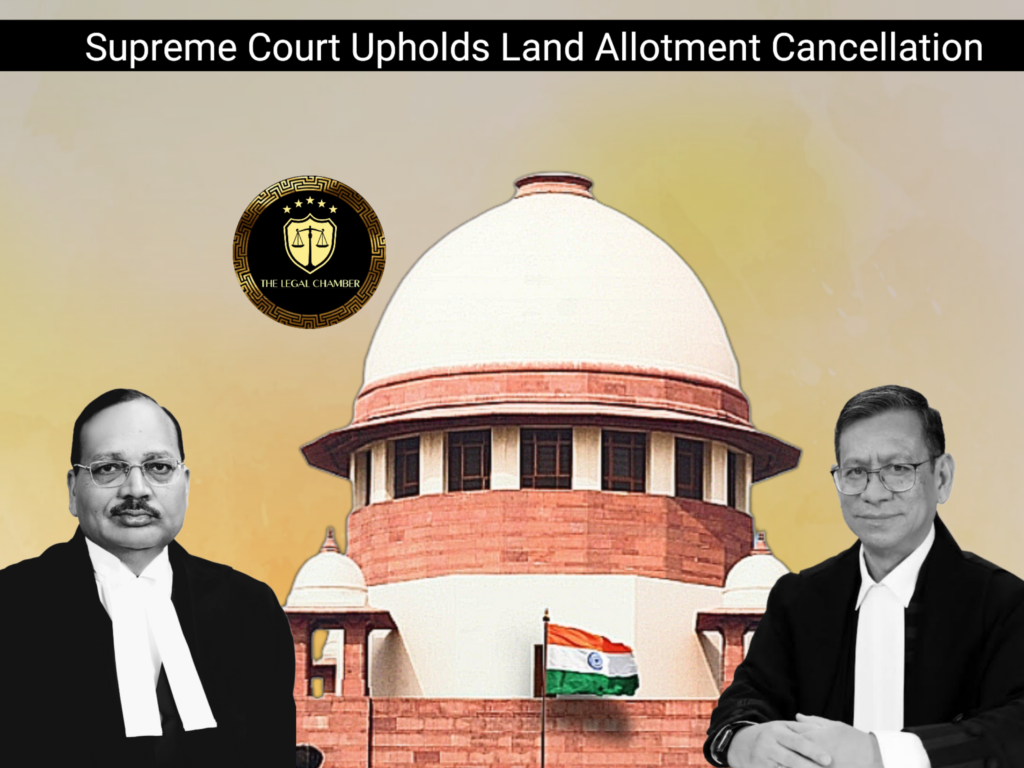
The Supreme Court upheld the cancellation of land allotment by UPSIDC due to the allottee’s persistent payment defaults and failure to fulfill contractual obligations. The Court found that UPSIDC had followed the prescribed procedure for cancellation, including issuing multiple notices. The Court also annulled a subsequent allotment of the same land, emphasizing the need for transparent and non-discriminatory allocation of public resources in line with the Public Trust Doctrine
Facts Of The Case:
Kamla Nehru Memorial Trust (KNMT) applied in March 2003 to purchase 125 acres of land in Uttar Pradesh for floriculture. On September 18, 2003, Uttar Pradesh State Industrial Development Corporation (UPSIDC) allotted the land, conditional upon certain terms, including a payment schedule. KNMT defaulted on the ‘reservation money’ by the October 18, 2003, deadline. UPSIDC granted an extension until November 17, 2003, warning of automatic cancellation upon non-compliance. KNMT eventually deposited the amount but requested a waiver of interest, which UPSIDC rejected, affirming its policy. KNMT later accepted the original terms on January 7, 2004.Despite an approved rescheduling of payments in July 2005 , KNMT continued to default. UPSIDC issued multiple notices for payment and the execution of the lease deed, which was a prerequisite for possession. KNMT, however, repeatedly sought demarcation and possession, alleging encroachment, which UPSIDC denied, stating the land was demarcated and free from encumbrance. Ultimately, UPSIDC cancelled the allotment on January 15, 2007, citing KNMT’s failure to make payments and execute the lease deed. KNMT challenged this cancellation, leading to a series of legal proceedings.
Procedural History:
The Kamla Nehru Memorial Trust (KNMT) initially challenged the cancellation of allotment by UPSIDC (Uttar Pradesh State Industrial Development Corporation) through Writ Petition No. 349/2007 (MB) before the High Court. The High Court, via an interim order on February 13, 2007, restrained UPSIDC from making any fresh allotment of the Subject Land. Subsequently, on May 27, 2009, the High Court disposed of the First Writ, directing the restoration of the allotment to KNMT, subject to certain conditions.Aggrieved by this decision, UPSIDC challenged the High Court’s order before the Supreme Court in SLP (C) No. 14680/2009. The Supreme Court remitted the matter back to the High Court, observing that the High Court had not discussed the validity of the cancellation order dated January 15, 2007, and directed a decision on merits expeditiously.In the interim, UPSIDC allotted the Subject Land to M/s Jagdishpur Paper Mills Ltd., which KNMT challenged in a new Writ Petition, Misc. Bench No. 11055/2013 (Second Writ). The High Court directed the parties to maintain status quo, an interim order that UPSIDC challenged in SLP (C) No. 7952/2014. On April 7, 2017, the Supreme Court directed the High Court to expedite the adjudication of both Writ Petitions filed by KNMT. Consequently, the High Court heard the matters and, through the Impugned Order dated May 29, 2017, upheld the cancellation of the Subject Land’s allotment. KNMT then preferred the present appeals before the Supreme Court , which, on November 17, 2017, stayed the operation of the Impugned Order during the pendency of these appeals.
READ ALSO:Gun, Gold Chain & Lies: Supreme Court Explains Why Conviction in 2006 Murder Stands
Court Observation:
The Court observed that KNMT’s contentions regarding non-demarcation, alleged encroachment, and non-delivery of possession were an afterthought, as the Allotment Letter included precise measurements and the allotment was “as is where is”. UPSIDC had, in fact, demarcated the land, which KNMT acknowledged. Claims of encroachment were also found to be without merit, supported by documentary proof of land acquisition and compensation. UPSIDC was only obligated to hand over possession after lease deed registration, as per the Manual, making KNMT responsible for the delay due to its failure to submit necessary documents.The Court found that UPSIDC’s cancellation was procedurally sound, with prior communications serving as valid legal notices despite not being explicitly captioned as such. KNMT was deemed a “chronic defaulter” due to persistent non-payment and requests for unwarranted concessions, justifying UPSIDC’s actions. The prolonged litigation highlighted systemic deficiencies in the allocation process, including the swift allotment to KNMT without a competitive process, which violated the Public Trust Doctrine by failing to ensure transparency and maximum public benefit.
Final Decision & Judgement:
The Supreme Court upheld the cancellation of the land allotment by UPSIDC, finding it to be fully justified and in accordance with the law. The Court also declared the allotment or any offer made by UPSIDC in favor of M/s Jagdishpur Paper Mills Ltd. (Respondent No. 3) for the Subject Land as illegal, contrary to public policy, and consequently annulled it. If any earnest money or payment was received from Respondent No. 3, UPSIDC was directed to refund it along with interest at the rate granted by Nationalized Banks. The appeals were dismissed with no order as to costs. Furthermore, considering the broader implications for transparent allocation of public resources and administrative accountability, the Court issued directions to the State Government of Uttar Pradesh and UPSIDC. They are mandated to ensure future allotments are made in a transparent, non-discriminatory, and fair manner, aiming to fetch maximum revenue while also achieving larger public interests such as industrial development priorities, environmental sustainability, and regional economic objectives. The Subject Land is also to be allotted strictly following this new procedure.
Case Details:
Case Title: Kamla Nehru Memorial Trust & Anr. Versus U.P. State Industrial Development Corporation Limited & Ors. Citation: 2025 INSC 791 Civil Appeal Nos.: (Arising out of SLP (C) Nos. 31887-88/2017) Date of Judgment: May 30, 2025 Judges/Justice Name: Surya Kant & Nongmeikapam Kotiswar Singh
Download The Judgement Here